
Thursday Feb 09, 2023
Global Health and Healthcare Research - with Eran Bendavid, MD
Main points
- Difference between healthcare and health
- Are we providing healthcare making a difference in people’s health?
- Healthcare research importance: What are the things that make a difference? Example: tuberculosis
- Importance of big data in global health research: large number of people needed to draw conclusions about the impact of measures without double blind trials. Example: Foreign aid
- Interface global health - public health - big data. Examples: global politics and global warming
- Influence of politics in healthcare research. Examples: Mexico City policy (abortion) and PEPFAR
- How do researchers maintain independence? Example: NIH
- Sources of funding at Stanford University. NIH, Stanford community (philanthropy)
- Mismatch between funding and public health priorities in developing countries. Examples: TB, HIV, malaria
- Main challenges for global health research. Difference between traditional research and global public good (examples: emerging diseases detection, guidelines). The latter is underfunded. Example: TB
- Strategic solutions with two examples: (1) A successful one and (2) a failure. For (1) Foreign aid with HIV/AIDS and GAVI, and (2) Clean water (book co-author: “Disease Control Priorities”)
- Government ownership and international intervention brigades for emergency situations (examples: Ebola, famines, wars)
- Research mechanisms: from top to bottom versus the inverse. The notion of respect and boots on the ground.
- Sharing research results: The usefulness of face to face international congresses given the cost and carbon footprint.
BIO
Dr. Bendavid’s academic appointments include:
- Associate professor, medicine - primary care and population health
- Senior fellow, stanford woods institute for the environment
- Senior fellow (by courtesy), freeman spogli institute for international studies
- Member, bio-x
- Faculty affiliate, institute for human-centered artificial intelligence (hai)
- Member, maternal & child health research institute (mchri)
His work broadly investigates the drivers of population health improvements in developing countries. He studies how economic, political, and natural environments affect population health. He uses a mix of experimental, econometric, qualitative, modeling, and demographic tools to produce insights and strategies for improving health. A sample of current projects address the following questions:
• What role does US foreign aid play in reducing mortality and improving equity in developing countries?
• What forms of engagement in health improvements - social marketing, public health interventions, or community empowerment, for example - work, and which do not?
• What effect do malaria control programs have on child mortality?
• What combination of prevention strategies are most cost-effective for Africa’s HIV epidemic?
• What is the evidence that foreign aid for health is good diplomacy?
• Which populations are most vulnerable to the effects of climate conditions on the availability of food?
His research focus is: Infectious disease.
No comments yet. Be the first to say something!